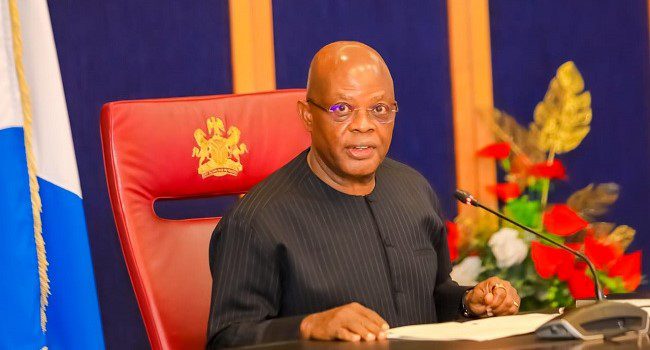By Paul Njowusi
Perhaps the most interesting account in the 17-chapter book, entitled: “Stepping on Toes” by Hadiza Bala Usman, a former Managing Director and Chief Executive Officer of the Nigerian Ports Authority (NPA) is chapter 9 that essentially dwells on the politics of Intels in the context of the power play within and outside the NPA. Hadiza captioned the chapter in a way that explicated how Intels might have allowed her to present it to the public as anti-government on the policy of Treasury Single Account (TSA). With this, she cleverly pitted the federal government against Intels for alleged non-compliance. She said in the account that Intels did not comply with the policy of the Federal Government of Nigeria on TSA for a very long time. The title of the chapter was apt for the objective she planned to achieve: “Intels and non-compliance with Treasury Single Account (TSA) policy.”
Whereas, the title looks so simply at the superficial level, but a read through the narrative showed how deep-seated the anti-Intels plots were. Hadiza harped on the purported interest of a former Vice-president, Atiku Abubakar, in the company. She pointed it out, albeit in passing, without discounting the intended ramifications of that stratagem. The purport was to insert a wedge in between the APC-led federal government and Intels by latching on the Atiku Abubakar interest in the company to help generate more APC government’s anti-Atiku Abubakar sentiments, resentment, and dissonance. She believed that having moved to the Peoples Democratic Party (PDP) from the APC, the government of the day should acquiesce in decisions that would disempower him and the opposition politician(s).

A deep interrogation of the narrative showed that Hadiza laid out the basis for the magnitude of her planned administrative action aimed at complete sinking of the company. Intels, by her accounts, committed a series of breaches of the rules, regulations and terms of the Agreement for the Pilotage contracts in the four districts, including the fund remittance component, in which it was benefitting 28 percent commission and non-payment of the revenues to the TSA and for which she claimed that the Chairman of Intels Nigeria Limited, Gabriele Volpi, would later, in a THISDAY report, apologise to the Federal Government and the NPA over the disagreement. She quoted THISDAY to have reported him thus: “We want to apologise to the Federal Government and NPA over this disagreement with Intels. I was not personally involved in the negotiations with NPA, but we apologise for what has happened. We intend to comply with the directive of government and transfer all the revenue(s) to the TSA because we are a law-abiding company.”
Read Hadiza: “The company eventually approached the NPA with an apology and request for negotiations, which the Authority granted. After several meetings, the parties reached an agreement whereby Intels committed to commence the payment of revenues collected from service boat operations to the TSA account as from 1 November 2017.
“The company was concerned that government didn’t have a good history of payments and that the NPA may begin to hold back their funds. To assuage this fear, we offered to pay the company interests on any delayed payment.
“Apart from the fact that it is government policy, the new SOP on the revenue collection was important because invoices were written in the name of NPA. Payments were also made into the Authority’s account. In effect, the NPA would now be able to know the exact amount of revenue being generated as opposed to the historic position where all invoices were issued in the name of, and payment made to Intels.”
My understanding of the renewed dispute that then lingered and led to the termination of the boat pilotage contract with Intels arose from the dilation of the remittance period by the company. The detailed narrative, as provided by Hadiza would suffice for the purpose of her narrative. But where Hadiza got it all wrong was her decision to disobey an order of the court when Intels proactively and preemptively secured one to restrain the NPA from terminating its boat pilotage contract. Hadiza had initially cancelled the contract even before it expired; thereafter, she withdrew the cancellation. Not even her rationalization that Intels participated in the fresh bids to supplant it and failed to qualify could cure that mischief of the NPA’s disobedience of an order of the court.
A review of the case showed that Hadiza had also gone ahead to seize land leased to Intels along with Berth 9-11 and allocated the same to ICTSI, thereby creating a Terminal with ocean going vessels and direct calls without proper concessioning process
Scanning through some other chapters that captured NPA’s relationship with BUA and LADOL, I could see that it was in the character of Hadiza-led management at the NPA to disobey court orders. What exactly motivated that disposition? Was it administrative rascality or the sheer rodomontade to honcho the sector populated by some powerful forces on whose toes she had loved to step. She claimed she did. Perhaps, she did in her own estimation. But where are both parties today? Intels is still in business with the NPA, while Hadiza had since been blown off by the aggressive winds of change. Her removal was made possible by the very fact of her causing the NPA to disobey a court order over the dispute with Intels. And, this was exactly the basis for her indictment by the Presidency and the Ministry of Transport.
Hadiza was asked to explain the reason she willfully refused to comply with an order of the Federal High Court in the suit which restrained the Nigerian Ports Authority from giving effect to the Public Notice No 4115 for the engagement of managing agents for the service boats in respect of the management of the Pilotage Contract between NPA and Messrs Intels, and instead authorized that the NPA should proceed with the procurement process during the pendency of a subsisting court order, thereby undermining the rule of law and exposing the federal government to the risk of potential damages arising from the willful disobedience of a valid court order.
Apparently self-opinionated, Hadiza in her response to the query, justified why she caused the NPA to disobey the court order. She said that the external counsel retained by NPA in the matter, Messrs Banwo and Ighodalo, advised that the Court Order secured by Intels, even though valid, could not prevent the NPA from carrying out its statutory functions. I shuddered at her limited understanding of the doctrine of power separation and the principle of checks and balances. Each arm of government has been provided with some powers to check the potential excesses of one another, otherwise, each will act ultravires of its powers. The lack of this understanding was the only motivation that could have given rise to the belief by Hadiza that the court order could not prevent the NPA from carrying out its statutory functions. Secondly, in her response to the query, Hadiza was said to have stated that the legal opinion by the external counsel was supported by the Authority’s Legal department, which conveyed the legal opinion to the Director. And I shuddered further at this tenuous defence. A wrong legal opinion cannot be cured by the support of multitude of legal counsel.
The intervention by the Minister of Justice and Attorney General of the Federation, Abubakar Malami (SAN) provided the basis for rebutting the position of Hadiza. Read the presidential/ministerial verdict: “While it would be appropriate to exonerate the suspended MD in respect of this alleged infraction, in light of the fact that she supported her action based on the legal advice she received from the External Counsel, it is imperative to state that the said legal opinion of the said External Counsel, Messrs Banwo & Ighodalo, was, with due respect, deeply flawed and against the run of our jurisprudence. An examination of the legal opinion shows clearly that the firm acknowledged that the ‘the learned Judge, Oweibo J. extended the life span of the ex parte order to such time as the suit is determined.’ That therefore made it a valid and subsisting order of court. It is trite law that an Order of court, no matter how perverse, remains valid until it is duly set aside by a superior court or by the court that issued the order. In the circumstances, NPA had the option of pursuing its appeal in the matter and or approaching the trial court to vary its order to enable the Authority continue to discharge the pilotage services pending the determination of the matter, rather than resorting to self-help and potentially exposing the government to damages arising from the disregard of the court order.”
The issues laid out supra were not captured by Hadiza in her narrative exactly the way they transpired, thus discounting the credibility of her book, which is account is liable to be dismissed as a cocktail half-truth and malpresentation. She had also failed to mention that she rejected offers made by Intels Ltd and its sister company Deepoffshore services Ltd for both parties to reach an amicable resolution: along the lines of writing off of $100m by Its sister company Deep offshore Ltd, reduction of cost of funds by its sister company from Libor+ 6.5% to Libor + 3% and reduction in commission payable to a Intels Ltd for service boats management and collections from 28 per cent to 18/20 per cent. Notably, NPA was also still owing the sister company over $700m as of the time of termination of the contract
The totality of these issues questions Hadiza’s integrity. It is indeed sad that a former public officer of her standing would resort to this stratagem of propagating half-truths, partial disclosures and even distorted presentations, to attract public sympathy in a grand orchestrated plot to mislead her readers.
Njowusi, writes in from Warri, Delta state.




